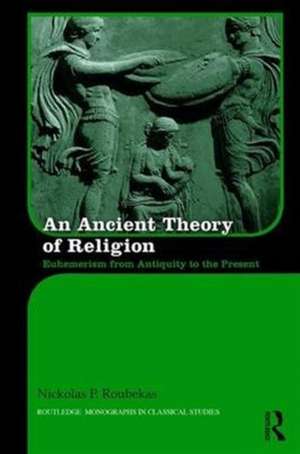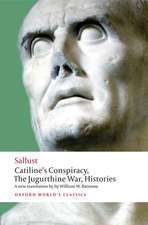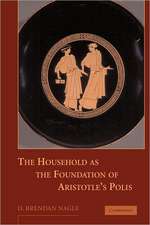An Ancient Theory of Religion: Euhemerism from Antiquity to the Present: Routledge Monographs in Classical Studies
Autor Nickolas Roubekasen Limba Engleză Hardback – 19 dec 2016
By studying the utilization of the theory in different periods—from the Graeco-Roman world to Late Antiquity, and from the Renaissance to the twenty-first century—this book explores the reception of the theory in diverse literary works. In so doing, it also unpacks the different adoptions and misrepresentations of Euhemerus’s work according to the diverse agendas of the authors and scholars who have employed his theory. In the process, certain questions are raised: What did Euhemerus actually claim? How has his theory of the origins of belief in gods been used? How can modern scholarship approach and interpret his take on religion? When referring to ‘euhemerism,’ whose version are we employing? An Ancient Theory of Religion assumes no prior knowledge of euhemerism and will be of interest to scholars working in classical reception, religious studies, and early Christian studies.
| Toate formatele și edițiile | Preț | Express |
|---|---|---|
| Paperback (1) | 389.66 lei 6-8 săpt. | |
| Taylor & Francis – 10 dec 2019 | 389.66 lei 6-8 săpt. | |
| Hardback (1) | 1109.51 lei 6-8 săpt. | |
| Taylor & Francis – 19 dec 2016 | 1109.51 lei 6-8 săpt. |
Din seria Routledge Monographs in Classical Studies
-
 Preț: 310.65 lei
Preț: 310.65 lei -
 Preț: 312.65 lei
Preț: 312.65 lei -
 Preț: 310.81 lei
Preț: 310.81 lei -
 Preț: 311.43 lei
Preț: 311.43 lei -
 Preț: 325.06 lei
Preț: 325.06 lei -
 Preț: 311.37 lei
Preț: 311.37 lei -
 Preț: 312.02 lei
Preț: 312.02 lei - 9%
 Preț: 935.66 lei
Preț: 935.66 lei - 9%
 Preț: 1039.79 lei
Preț: 1039.79 lei -
 Preț: 310.37 lei
Preț: 310.37 lei - 9%
 Preț: 970.50 lei
Preț: 970.50 lei -
 Preț: 312.56 lei
Preț: 312.56 lei -
 Preț: 311.18 lei
Preț: 311.18 lei -
 Preț: 325.64 lei
Preț: 325.64 lei -
 Preț: 309.90 lei
Preț: 309.90 lei -
 Preț: 311.41 lei
Preț: 311.41 lei - 9%
 Preț: 936.87 lei
Preț: 936.87 lei - 8%
 Preț: 383.06 lei
Preț: 383.06 lei - 48%
 Preț: 570.60 lei
Preț: 570.60 lei -
 Preț: 488.71 lei
Preț: 488.71 lei - 29%
 Preț: 995.97 lei
Preț: 995.97 lei -
 Preț: 482.27 lei
Preț: 482.27 lei - 18%
 Preț: 946.74 lei
Preț: 946.74 lei -
 Preț: 484.47 lei
Preț: 484.47 lei - 15%
 Preț: 427.16 lei
Preț: 427.16 lei -
 Preț: 369.77 lei
Preț: 369.77 lei -
 Preț: 386.77 lei
Preț: 386.77 lei - 30%
 Preț: 849.65 lei
Preț: 849.65 lei - 23%
 Preț: 321.20 lei
Preț: 321.20 lei - 18%
 Preț: 956.39 lei
Preț: 956.39 lei - 15%
 Preț: 427.16 lei
Preț: 427.16 lei - 18%
 Preț: 1060.25 lei
Preț: 1060.25 lei - 15%
 Preț: 427.16 lei
Preț: 427.16 lei - 18%
 Preț: 1119.16 lei
Preț: 1119.16 lei -
 Preț: 371.71 lei
Preț: 371.71 lei -
 Preț: 452.14 lei
Preț: 452.14 lei - 26%
 Preț: 765.59 lei
Preț: 765.59 lei - 30%
 Preț: 819.48 lei
Preț: 819.48 lei -
 Preț: 416.22 lei
Preț: 416.22 lei - 18%
 Preț: 1050.78 lei
Preț: 1050.78 lei
Preț: 1109.51 lei
Preț vechi: 1353.07 lei
-18% Nou
Puncte Express: 1664
Preț estimativ în valută:
212.31€ • 222.41$ • 175.95£
212.31€ • 222.41$ • 175.95£
Carte tipărită la comandă
Livrare economică 08-22 aprilie
Preluare comenzi: 021 569.72.76
Specificații
ISBN-13: 9781138848931
ISBN-10: 113884893X
Pagini: 202
Dimensiuni: 156 x 234 x 18 mm
Greutate: 0.46 kg
Ediția:1
Editura: Taylor & Francis
Colecția Routledge
Seria Routledge Monographs in Classical Studies
Locul publicării:Oxford, United Kingdom
ISBN-10: 113884893X
Pagini: 202
Dimensiuni: 156 x 234 x 18 mm
Greutate: 0.46 kg
Ediția:1
Editura: Taylor & Francis
Colecția Routledge
Seria Routledge Monographs in Classical Studies
Locul publicării:Oxford, United Kingdom
Public țintă
Postgraduate and UndergraduateCuprins
Acknowledgments
Introduction: Why Study Euhemerism?
1. Euhemerus’s Euhemerism
2. Before Euhemerus
3. Returning to the Sources
4. Euhemerism and Atheism
5. Euhemerus, Divine Kingship, and Irony
6. Citing the Citations: Anti–‘Pagan’ Euhemerism and Identity Formation
7. Turning the Tables: Anti–Christian Euhemerism in Celsus
8. Seeing ‘Euhemerism’ Everywhere
Afterword: On the Use and Abuse of a Theory
Index
Introduction: Why Study Euhemerism?
1. Euhemerus’s Euhemerism
2. Before Euhemerus
3. Returning to the Sources
4. Euhemerism and Atheism
5. Euhemerus, Divine Kingship, and Irony
6. Citing the Citations: Anti–‘Pagan’ Euhemerism and Identity Formation
7. Turning the Tables: Anti–Christian Euhemerism in Celsus
8. Seeing ‘Euhemerism’ Everywhere
Afterword: On the Use and Abuse of a Theory
Index
Recenzii
"Nickolas Roubekas is to be congratulated for producing an eminently readable and carefully researched account of Euhemerus’ theory and its variegated transformations throughout the centuries, highlighting biases, intentional or unintentional omissions, modifications and manipulations of the Messenian’s work. The fruits of his integrated approach, effortlessly communicating between classical scholarship and religious studies, are heartily recommended to the students and scholars of these disciplines." - Juraj Franek, Journal of Cognitive Historiography
"Nickolas Roubekas rediscovers the long shadow cast by Euhemerus of Messene over the history of conceptualizing the divine from Hellenistic times to the present. While building on classical studies on Euhemerus and his reception, Roubekas presents scholarship on religion with a timely appropriation of Euhemerus and the discourse he elicited on the origins of gods and the divine for the contemporary study of religion. This study of Euhemerus provides the necessary groundworkfor retrieving the discursive processes of manufacturing divinity that lie at the foundation of the history of European Christianity." - Professor Gerhard van den Heever, University of South Africa
"This book provides an important contribution to the understanding of Euhemerism ... Nickolas Roubekas provides a rigorous study both of Euhemerism in its original sense, and the cultural history of its reception, for an audience of both Classicists and students of religion ... ‘Whose Euhemerism?’ is the right question to pose, as the conclusion states (p. 182). Apart from contributing several different insights to particular issues that will appeal to classicists and students of religion, and achieving a most helpful overall presentation of the Euhemeristic tradition, this book is important above all because it will force every future user of the term, of whichever discipline, to pose that question and weigh carefully how to answer it." - Miguel Herrero de Jáuregui, Acta Classica
"Roubekas' project is stimulating. I hope more scholars follow his example and place ancient thinkers into dialogue with modern theorists of religion." - Nathan J. Ristuccia, Religion & Theology
"Roubekas tries to draw a distinction not only between Euhemerus and later manifestations of his thought, but also between Euhemerus and older or contemporary writers who are assumed to have influenced him, namely Xenophanes of Colophon, Democritus, Prodicus of Ceos, and Critias. This effort results in a solid and detailed analysis of both Euhemerus and his supposed sources." - Benjamin Garstad, MacEwan University, Edmonton, Canada
"Nickolas Roubekas rediscovers the long shadow cast by Euhemerus of Messene over the history of conceptualizing the divine from Hellenistic times to the present. While building on classical studies on Euhemerus and his reception, Roubekas presents scholarship on religion with a timely appropriation of Euhemerus and the discourse he elicited on the origins of gods and the divine for the contemporary study of religion. This study of Euhemerus provides the necessary groundworkfor retrieving the discursive processes of manufacturing divinity that lie at the foundation of the history of European Christianity." - Professor Gerhard van den Heever, University of South Africa
"This book provides an important contribution to the understanding of Euhemerism ... Nickolas Roubekas provides a rigorous study both of Euhemerism in its original sense, and the cultural history of its reception, for an audience of both Classicists and students of religion ... ‘Whose Euhemerism?’ is the right question to pose, as the conclusion states (p. 182). Apart from contributing several different insights to particular issues that will appeal to classicists and students of religion, and achieving a most helpful overall presentation of the Euhemeristic tradition, this book is important above all because it will force every future user of the term, of whichever discipline, to pose that question and weigh carefully how to answer it." - Miguel Herrero de Jáuregui, Acta Classica
"Roubekas' project is stimulating. I hope more scholars follow his example and place ancient thinkers into dialogue with modern theorists of religion." - Nathan J. Ristuccia, Religion & Theology
"Roubekas tries to draw a distinction not only between Euhemerus and later manifestations of his thought, but also between Euhemerus and older or contemporary writers who are assumed to have influenced him, namely Xenophanes of Colophon, Democritus, Prodicus of Ceos, and Critias. This effort results in a solid and detailed analysis of both Euhemerus and his supposed sources." - Benjamin Garstad, MacEwan University, Edmonton, Canada
Descriere
An Ancient Theory of Religion examines a theory of religion put forward by Euhemerus of Messene (late 4th – early 3rd century BCE) in his lost work Sacred Inscription, and shows not only how and why euhemerism came about but also how it was - and still is - used.
















